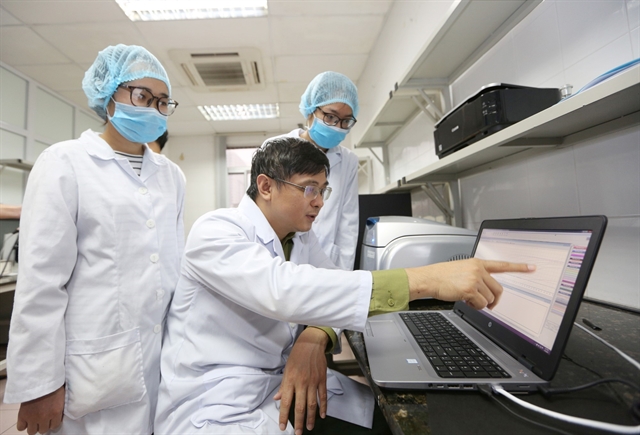Inventor of made-in-Viet Nam Covid-19 quick test kits honoured as top inspirer
It has been almost a year since Dr Hoang Xuan Su and his colleagues at the Vietnam Military Medical University started to conduct research on Covid-19 quick tests.
 |
| Dr Hoang Xuan Su (centre) and other researchers from the Viet Nam Military Medical University successfully developed made-in-Viet Nam Covid-19 quick test kits |
The made-in-Viet Nam Covid-19 quick test kits were recognised by the World Health Organization and are being used in eight other countries.
The success of the quick test kits not only helped Viet Nam become more active in diagnosing infection cases but also opened up export opportunities, inspired and spread Vietnamese aspirations around the globe.
Major, Dr Hoang Xuan Su, head of the Department of Microbiology and Pathogenesis, Military Medical Research Institute, who played a core part in the quick test research has been nominated by vietnamnet online newspaper this month as one of 2020's top inspirers.
Being familiar with deadly viruses like Ebola or hepatitis B, C virus, and dengue fever, Dr Su did not hesitate to step up as the leader of the Covid-19 test kit research team when they started their work nearly a year ago.
When the pandemic broke out in China this time last year, he registered as a member of the Global Initiative on Sharing All Influenza Data to get access to the world's data sources, including many genetic sequences of new coronavirus strains that scientists decoded.
On January 13, 2020, Dr Su approached Covid-19's genetic sequence for the first time through his relationship with German scientists. This was the very first clue he had in the process of developing the Covid-19 test kit.
On January 23, 2020 or a day before the 2020 Lunar New Year, Viet Nam announced the first two positive cases of Covid-19.
An urgent meeting was convened right after at the Vietnam Military Medical University where Su’s research team was assigned to study the test kits.
The research team included leading experts in microbiology, immunology, molecular biology, infection control, infectiousness, preventive medicine along with the university’s graduates and students of the University of Natural Sciences, Hanoi National University who were doing their graduation thesis.
The university’s board of directors directly assigned Su to design the test procedure as well as develop the test kit evaluation methods.
The team had almost no New Year holiday and embarked on the research right after that.
“I spent the whole afternoon of the first lunar new year day analysing and comparing gene sequences collected from the database.
“We had a lot of pressure to race against time because the Ministry of Science and Technology set the deadline that after two weeks of research, we must have a test kit ready for testing and after one month, it can be put into use,” Su told vietnamnet.vn.
The team performed five to ten experiments per day on average. Each experiment lasted two hours, not to mention the preparation process which took a lot of time.
“There were days when we had to work overnight. Sometimes we finished our work and went home at 2-3am and had to be present at the lab at 7am to continue the research. Sleeping on the desk was a very normal scene.”
Covid-19 is classified as a group A infectious disease, which is an extremely dangerous disease and capable of being transmitted very quickly, widely and having high mortality or unknown effects.
Researchers at the lab are the most susceptible to infection so they must always be fully equipped with protective equipment and strictly comply with prevention protocol, biosafety and biosecurity regulations.
On the first days, the research team also faced a shortage of materials because the suppliers were off during the new year holiday.
The kits use Reverse Transcription Polymerase Chain Reaction (RT-PCR) like other kits but show results in a shorter time (only two hours).
After the kits were put into mass production in March, the research team was honoured to receive a series of awards from the Ministry of Education and Training and the Ministry of Science and Technology for their contributions in the fight against Covid-19 in Viet Nam.
The test kits developed by the Military Medical Academy have been certified to meet European standards and a certificate of free sale from the UK Department of Health and Social Care.
According to the manufacturer, the total number of Covid-19 test kits exported from Viet Nam has been more than 20,000 sets. Each kit includes 50 tests which are sold at VNĐ400,000-600,000 each. Each test can be used one time.
Viet Nam has sold or presented the quick tests for free to Laos, Cambodia, Indonesia, Ukraine, Poland, Hungary and Austria. Negotiations are under way to export the kits to 20 other countries.
Source: VNS








